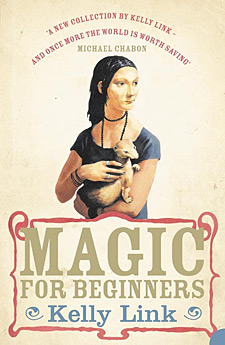Kelly Link is well known in the fantasy fiction community as editor of the annual Years Best Fantasy and Horror anthologies. But she has also received several awards for her own fiction, winning both the Hugo and Nebula awards. Her first collection of stories, Stranger Things Happen, met with great critical acclaim. Magic for Beginners is her second collection.
 Link writes "urban fantasy', a genre which supposes that there is magic in the shadows and crevices of the everyday world. It is quite a young genre and not especially popular, but interest has been growing. Neil Gaiman is one author who has achieved some success in the field.
Link writes "urban fantasy', a genre which supposes that there is magic in the shadows and crevices of the everyday world. It is quite a young genre and not especially popular, but interest has been growing. Neil Gaiman is one author who has achieved some success in the field.
Her stories read like a cross between modern literature and fairy tales. She writes beautifully, with prose that is both sparing and potent. There is a good helping of wit in her stories " some parts are laugh-out-loud funny.
Link is a word artist, and enjoys filling her stories with intriguing and provocative sentences. For example, “Eric was Night and Batu was Day. The girl, Charley, was the Moon” or “Before the raiding party arrived, the whole village packed up all of their belongings and moved into the handbag” or “The Devil’s got a flashlight with two dead batteries”.
She rejects traditional plotting. She seems more concerned about exploring moods, expressions and ideas. And they are very inventive ideas, original in a way that few other stories are. They seem to defy sensible summary. For example, the title story, Magic for Beginners (which won the Nebula) concerns a magic library inside a magic tree inside a magic TV show " and also a writer, a phone booth and a wedding chapel. Perhaps you see what I mean!
For Link, the journey through words and ideas is more important than any clear destination. This will be a problem for some readers, I think. Very few of the stories are “resolved” in any meaningful sense. It almost seems as if Link plays with the ideas until they no longer interest her, and then she stops. I always enjoyed her stories, yet I often felt unsatisfied by their conclusions.
It is interesting to consider a Christian response. Link’s stories explore morality in a subtle way, but there is nothing recognisably Christian in the ethics of her fiction. Sometimes the opposite. I can’t recall her ever discussing God, but one story did feature the Devil. Unfortunately, he was presented as a sympathetic, amusing and somewhat benevolent character.
Still, Link’s stories, and the genre as a whole, have this one great redeeming feature. They suggest that the world is much bigger and much stranger than it might appear on the surface. Christians will agree with Link that there is indeed something profound and powerful behind the veil of the material world around us.
Link’s writing is some of the finest I have seen. Still, her stories are subtle and unusual, and I suspect many people will find them difficult. But for fans of urban fantasy, or hard-core readers looking for something a bit different, I recommend you take a look.





















